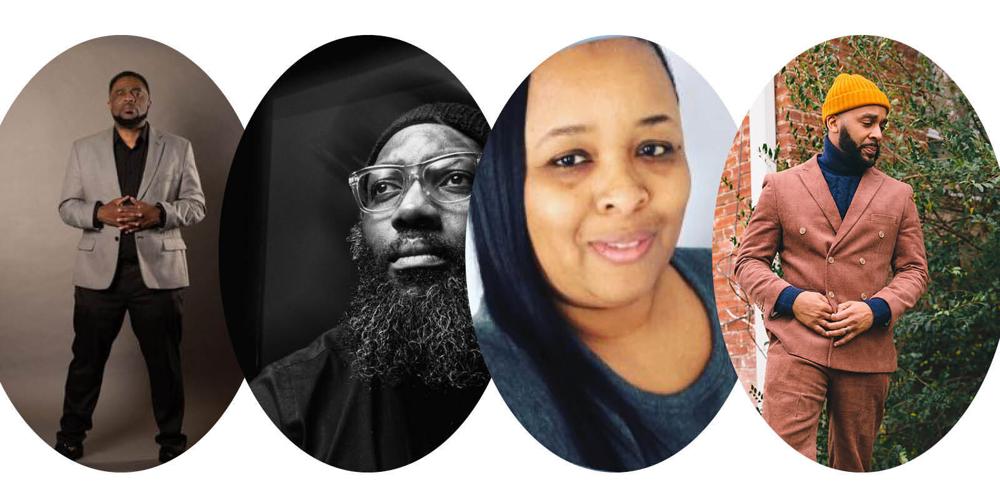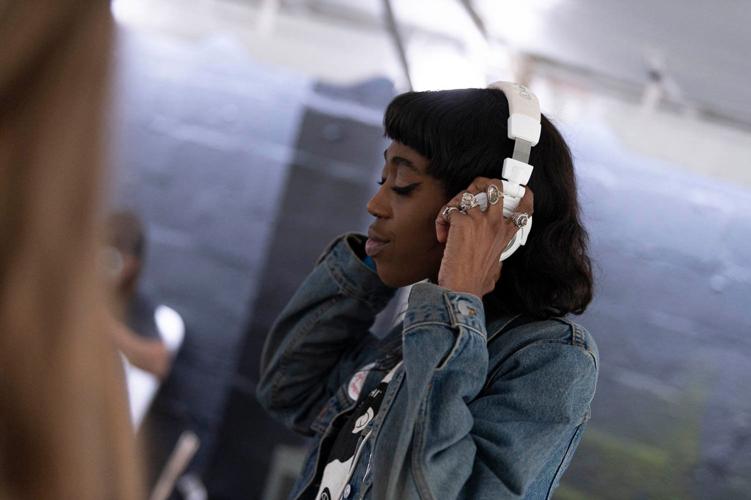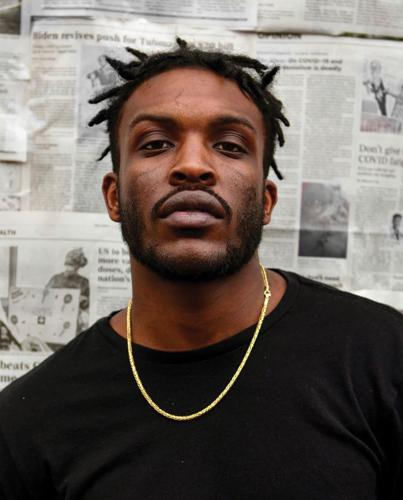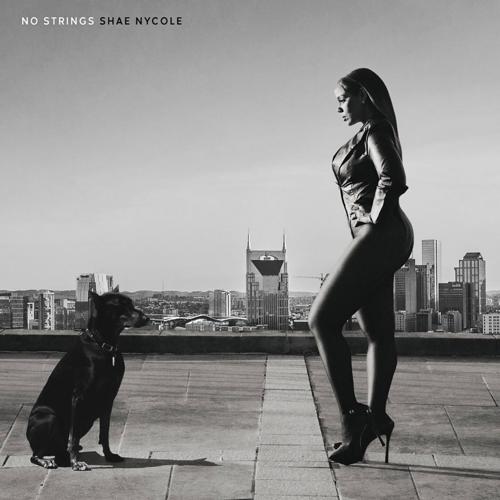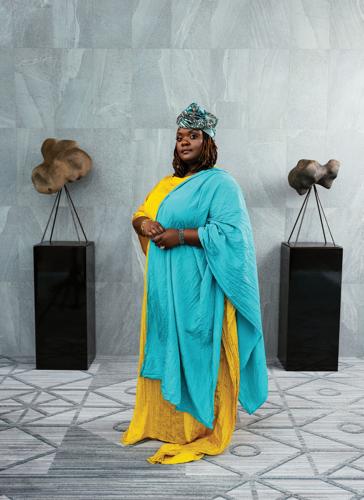Our second annual roundtable explores five key issues facing contemporary Black musicians in Nashville. We asked a cross-section of folks across the musical spectrum, including both performers and those who present and/or promote the music to audiences. Our panel included three returning participants this year: Erica Hayes Schultz, host of Soul of the City on community radio station WXNA; singer-songwriter Jason Eskridge, whose Sunday Night Soul series at The 5 Spot celebrates its 10th anniversary in April; and poet, spoken-word artist, author and performer Rashad Rayford, aka Rashad tha Poet. One new participant joined in: Kenny Smoov, whose many roles include program director and morning show host at radio station 92Q and vice president of urban formats at Cumulus Westwood One.

Kenny Smoov, Jason Eskridge, Erica Hayes Schultz, Rashad Rayford
What are the toughest problems facing local Black musicians in Nashville?
Kenny Smoov: I think the toughest part is finding a way to connect the dots from creation to monetization. Black artists just don’t have the live venues, mass-media support and fan-building machine that’s available to country.
Rashad Rayford: Resources are still an issue. The lack of consistency in venues to showcase talent has continued to plague the growth of many Black artists’ ability to elevate outside of the same streams and ponds. Black artistry is sometimes boxed in, and it isn’t allowed to flourish in certain spaces. I think we have to continue to search for creative ways to have our art seen and heard. Sometimes it feels as if the resource conversation isn’t going to change, so we have to use our collective ingenuity and work together to find success.
Erica Hayes Schultz: A lack of venues to perform at. Many venue owners already treat artists not great compared to other cities, but with Black artists there is either a lack of dates for them to play, a “need for security,” or many are told that their event is not expected to have a viable crowd attending, all of which are not true.
Jason Eskridge: Lack of access to shows and stages that not only provide exposure, but also decent payment.

Chuck Indigo
Are conditions and opportunities improving, getting worse or remaining the same?
KS: I think it’s steady. But unfortunately, it’s been steady in a bad way!
RR: The scene’s changing, but it’s still very slow. There’s more awareness about the richness of Black music in this city. Yet the industry’s still catching up in providing equal opportunities and support. We’re inching forward, but there’s a long road ahead. Honestly, at this point we should be light-years ahead.
EHS: Seems to remain the same since I’ve been in town. You’ll see some spurts of Black shows outside of larger venues, but overall there is a struggle.
JE: I believe they are improving.

Shae Nycole
Who are some emerging or current Black artists who deserve wider exposure and more recognition?
KS: Shae Nycole and the entire Weirdo Workshop should be stars today. We need a bigger brand push on them!
RR: Yola, Bren Joy, Ron Gilmore, Mike Floss, A.B. Eastwood and Daisha McBride are a few of the many artists who are continuing to push the envelope and reshape what music in Nashville sounds like.
EHS: DJ Afrosheen, Chuck Indigo, Lord Goldie.
JE: Kyshona, Kenny Dewitt, The Magi, Roz Malone, Kenny Sharp, Larysa Jaye, Jay White, Quiet Entertainer.

DJ Afrosheen
What would you like to see the city and/or its arts and governing bodies do regarding their interaction with and treatment of local Black artists?
KS: That we use the big reach and media machines to push Black artists of every genre. The push of inclusion for Black country artists has been strong. Not so much outside of the genre.
RR: I’d love to see the city and arts bodies actively invest in Black artists. Create more inclusive platforms, fund grassroots movements and recognize the breadth of our music. It’s about genuine support, not just token gestures, to cultivate a thriving, diverse music scene. Nashville’s Black artists across all genres have laid an incredible foundation for music in this city — the return on investment has not measured up.
EHS: I’d like to see a couple of Black-owned venues either in prime locations, or with excellent advertising and social media presence, to get people to attend. I’d like the city to work to remove barriers to venue ownership — creating attractive areas, removing barriers imposed by other owners or venues. I feel the city government is making an effort to reach out and include Black artists, but a lot of art comes and becomes well-known on its own without city or government help.
JE: In the 25 years I’ve been in Nashville, I’ve seen consistent growth in how the city supports and champions its Black artists. Organizations like the Nashville Convention & Visitors Corp, Metro Arts and Lovenoise have been instrumental in that growth. (Shout-out to Butch Spyridon, Deana Ivey, Chuck Beard and Eric Holt.) I would like to see this growth continue, and believe that it will as the city grows not only in its size and population, but also its diversity.

Kyshona
Can Nashville ever become as big a hub for contemporary Black music as Atlanta, or do you feel the Nashville Black music scene has grown as large as it ever will or can?
KS: I think it will grow as more resources — and people that can push contemporary Black music — move into the area. It’s slowly rising and nothing fixes things like a few HIT RECORDS!!!
RR: We’ve got history and talent in spades, but we need to foster a culture that embraces all music genres. With intentional investment and open-mindedness, Nashville could well become a contemporary Black music powerhouse, but it’s a collective effort. Shannon Sanders, Gina Waters Miller, Louis York and others are doing their part to keep pushing us forward from the corporate standpoint. I’d love to see more cross-blending of our music to help build fan bases and introduce other folks to artists right here in Nashville.
EHS: I’m from Atlanta, was involved in the music scene in a small way through radio, and left when I got married and moved to San Francisco. Based on my experience, I don’t think it’ll ever be Atlanta because that was 30 years in the making, with a lot of help from creators and power brokers who had an expansive vision. I think the power brokers in Nashville are still small-town-minded, and they get support to keep it a small town from citizens who are angry at “New Nashville.” I think eventually there will be a small hub for Black music here, but it will be limited, because any major growth will be pushed back as a “New Nashville” thing versus supporting artists who are from Nashville but just happen to look different from what you’re used to.
JE: As Atlanta is known for hip-hop and R&B, Nashville is primarily known for country and CCM music. I believe those will always be the cornerstones for our local music scene. That said, as the city grows and becomes more and more diverse, that will only strengthen the infrastructure of the Black music scene. With the support of the city (both corporately and individually) and artists’ continued commitment to making great music, I believe the sky’s the limit for the Nashville Black music scene. But as with most things, only time will tell.
Talking with Bully’s rock ’n’ roll polymath Alicia Bognanno, counting down the year’s top local albums and more

